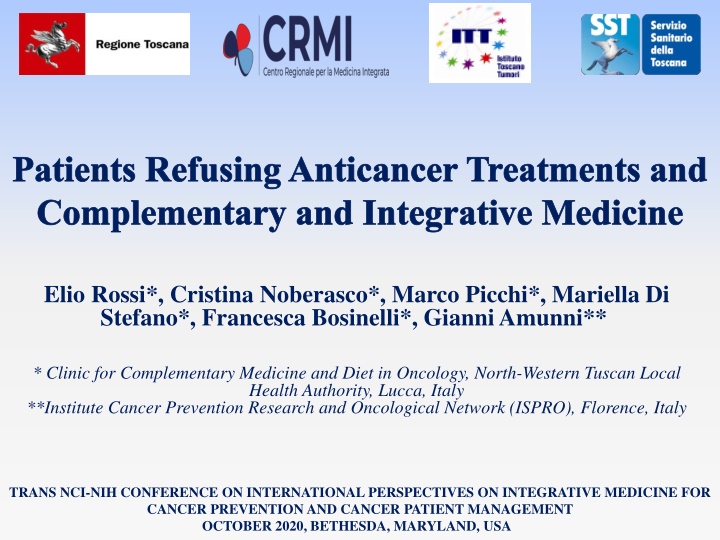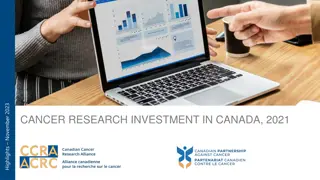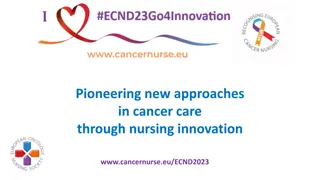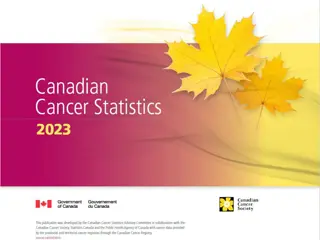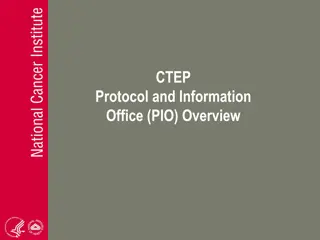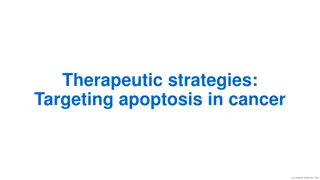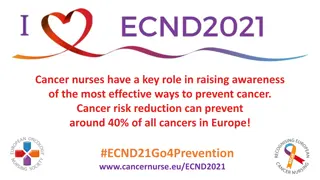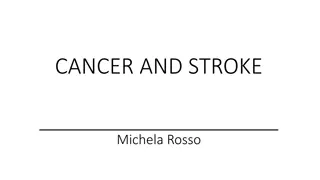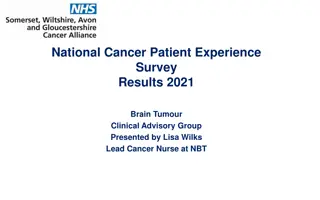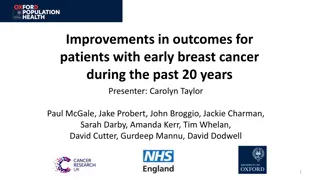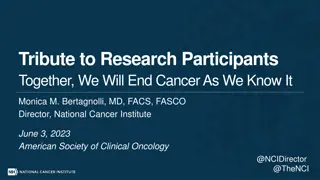Refusal of Conventional Cancer Treatments: Study Insights
This study conducted at a Clinic for Complementary Medicine in Oncology explored reasons behind cancer patients' refusal of conventional treatments. Results show patients' preferences, concerns, and outcomes, emphasizing the role of integrative oncology in patient communication and treatment management.
Download Presentation

Please find below an Image/Link to download the presentation.
The content on the website is provided AS IS for your information and personal use only. It may not be sold, licensed, or shared on other websites without obtaining consent from the author.If you encounter any issues during the download, it is possible that the publisher has removed the file from their server.
You are allowed to download the files provided on this website for personal or commercial use, subject to the condition that they are used lawfully. All files are the property of their respective owners.
The content on the website is provided AS IS for your information and personal use only. It may not be sold, licensed, or shared on other websites without obtaining consent from the author.
E N D
Presentation Transcript
Patients Refusing Anticancer Treatments and Complementary and Integrative Medicine Elio Rossi*, Cristina Noberasco*, Marco Picchi*, Mariella Di Stefano*, Francesca Bosinelli*, Gianni Amunni** * Clinic for Complementary Medicine and Diet in Oncology, North-Western Tuscan Local Health Authority, Lucca, Italy **Institute Cancer Prevention Research and Oncological Network (ISPRO), Florence, Italy TRANS NCI-NIH CONFERENCE ON INTERNATIONAL PERSPECTIVES ON INTEGRATIVE MEDICINE FOR CANCER PREVENTION AND CANCER PATIENT MANAGEMENT OCTOBER 2020, BETHESDA, MARYLAND, USA
Aims and Methods Aims: This observational prospective study was conducted at the Clinic for Complementary Medicine and Diet in Oncology, Campo di Marte Hospital, Lucca, Italy, and aimed at better clarifying why and when cancer patients tend to refuse conventional treatments. Methods: Overall, 549 cancer F=84.7%), with a median age of 57 years (age range: 19 89 years), were consecutively visited at our Clinic for Complementary Medicine and Diet in Oncology from September 2013 to December 2019. Among those patients, a subsample of 35 patients refusing conventional treatments was recruited. Furthermore, a specific Questionnaire was developed in order to explore the possible reasons why patients refuse conventional treatments, as well as their expectations and feelings related to conventional treatments themselves. patients (M=15.3%, Anticancer Therapies Refused Frequency Percentage 21 6 3 2 1 60.0% 17.1% 8.6% 5.7% 2.9% Refused Chemotherapy Refused Endocrine Therapy Refused Radiotherapy Refused Surgery Refused Immunotherapy 1 2.9% Refused Growth Factors 35 100% Total
Results Our sample was distributed as follows: 21 patients (60%) refused chemotherapy; 6 patients (17.1%) refused hormone therapy; 2 patients (5.1%) refused radiotherapy; 2 patients (5.7%) refused surgery; 2 patients (5.7%) refused any conventional treatment; 1 patient (2.9%) refused immunotherapy and 1 patient (2.9%) refused growth factor therapy. The main reasons underlying their refusal were investigated through our Questionnaire and are listed Noteworthy, after the first (baseline) Complementary Medicine visit, 17 patients (48.7%) from the sample decided to undergo conventional treatments. To date, 17 patients (48.6%) are currently in good conditions, 3 patients (8.6%) are currently in a disease progression phase, 9 (25.7%) patients passed away, while 6 patients (17.1%) dropped out the visits. Frequency 11 6 4 Percentage 31.4 17.1 11.4 Philosophical Reasons Prefers Alternative Therapies Side Effects on a Significant Other s Conventional Treatments Avoidance of adverse effects Lack of chemotherapy efficacy Unknown Too advanced stage of disease Side effects of previous chemotherapy Concerns about toxicity Fear of side effects on mobility Fear of side effects on sexuality Functional/esthetical reasons Total 3 3 2 1 1 1 1 1 1 35 8.6 8.6 5.7 2.9 2.9 2.9 2.9 2.9 2.9 100.0 Table 1: main reasons underlying patients refusal to conventional treatments.
Conclusions Conclusions: Indeed, the present study suggests that a Complementary Medicine Clinic with experts in Integrative Oncology may effectively contribute to improve the communication with patients, especially with those who tend to refuse conventional treatments, and may thus play a positive role in treatment refusal management. References: - Huchcroft S.A., Snodgrass T. Cancer patients who refuse treatment. Cances Causes Control 1993; 4:179-185. - van Kleffens T.I., van Leeuwen E. Physicians evaluations of patients decision to refuse oncological treatment. J Med Ethics 2005; 31(3): 131-6. Thank You for Your Attention e-mail to: eliogiovanni.rossi@uslnordovest.toscana.it
